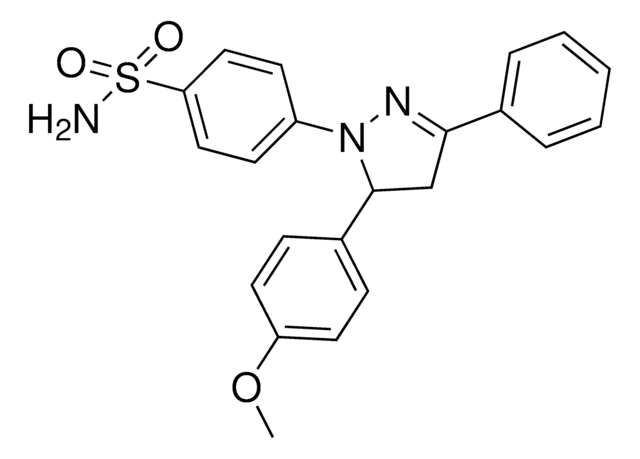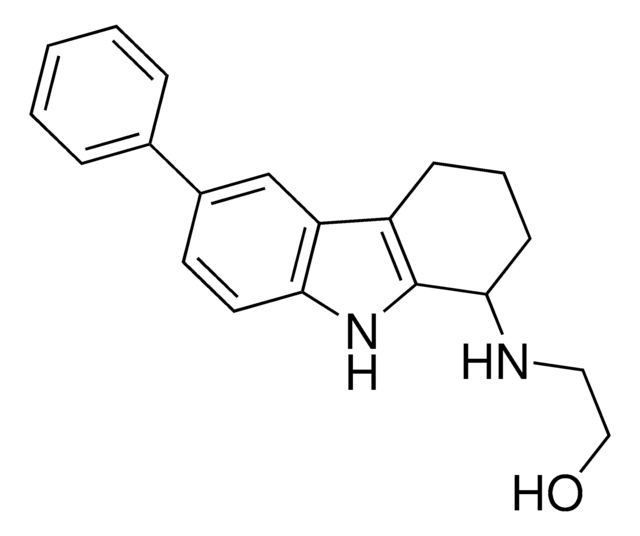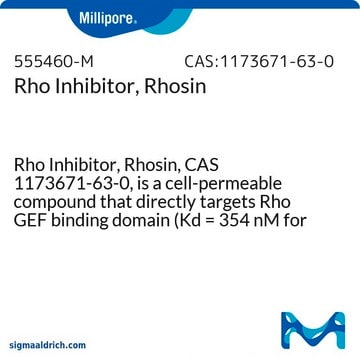217708
ML141
≥99% (HPLC), solid, Cdc42/Rac1 GTPase inhibitor, Calbiochem®
Synonym(s):
Cdc42/Rac1 GTPase Inhibitor, ML141, CDC42 GTPase Inhibitor II, CDC42 Inhibitor II, Rac1 Inhibitor V, Rac1 GTPase Inhibitor II, CID2950007, (±)-4-(5-(4-Methoxyphenyl)-3-phenyl-4,5-dihydro-1H-pyrazol-1-yl))-benzenesulfonamide, (±)-4-(4,5-Dihydro-5-(4-methoxyphenyl)-3-phenyl-1H-pyra, CDC42 GTPase Inhibitor II, CDC42 Inhibitor II, Rac1 Inhibitor V, Rac1 GTPase Inhibitor II, CID2950007, (±)-4-(5-(4-Methoxyphenyl)-3-phenyl-4,5-dihydro-1H-pyrazol-1-yl))-benzenesulfonamide, (±)-4-(4,5-Dihydro-5-(4-methoxyphenyl)-3-phenyl-1H-pyraz
About This Item
Recommended Products
Product Name
Cdc42/Rac1 GTPase Inhibitor, ML141, The Cdc42/Rac1 GTPase Inhibitor, ML141 controls the biological activity of Cdc42/Rac1 GTPase. This small molecule/inhibitor is primarily used for Membrane applications.
Quality Level
Assay
≥99% (HPLC)
form
solid
manufacturer/tradename
Calbiochem®
storage condition
OK to freeze
protect from light
color
yellow-white
solubility
DMSO: 50 mg/mL
shipped in
ambient
storage temp.
−20°C
InChI
1S/C22H21N3O3S/c1-28-19-11-7-17(8-12-19)22-15-21(16-5-3-2-4-6-16)24-25(22)18-9-13-20(14-10-18)29(23,26)27/h2-14,22H,15H2,1H3,(H2,23,26,27)
InChI key
QBNZBMVRFYREHK-UHFFFAOYSA-N
General description
Packaging
Warning
Reconstitution
Other Notes
Probe Reports from the NIH Molecular Libraries Program [Internet]. Bethesda (MD): National Center for Biotechnology Information (US); 2010-.2010 Feb 27. (http://www.ncbi.nlm.nih.gov/books/NBK51965/)
Legal Information
Storage Class Code
11 - Combustible Solids
WGK
WGK 3
Flash Point(F)
Not applicable
Flash Point(C)
Not applicable
Certificates of Analysis (COA)
Search for Certificates of Analysis (COA) by entering the products Lot/Batch Number. Lot and Batch Numbers can be found on a product’s label following the words ‘Lot’ or ‘Batch’.
Already Own This Product?
Find documentation for the products that you have recently purchased in the Document Library.
Our team of scientists has experience in all areas of research including Life Science, Material Science, Chemical Synthesis, Chromatography, Analytical and many others.
Contact Technical Service







